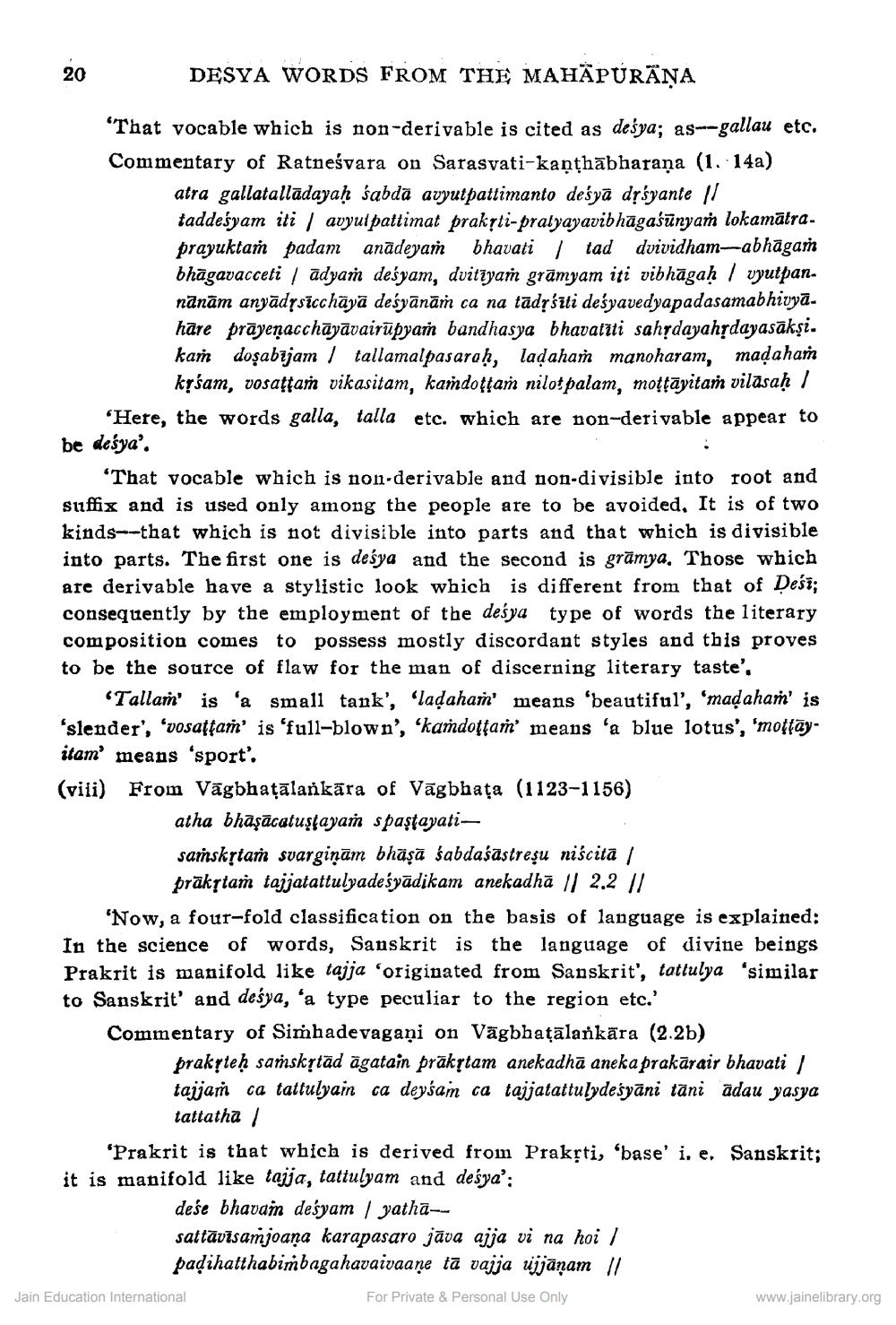________________
20
DESYA WORDS FROM THE MAHÄPURĀŅA
"That vocable which is non-derivable is cited as desya; as--gallau etc. Commentary of Ratnešvara on Sarasvati-kaṇṭhābharaṇa (1. 14a) atra gallatalladayaḥ śabdā avyuṭpattimanto desya dṛsyante || taddesyam iti avyulpattimat prakṛti-pratyayavibhāgaśūnyaṁ lokamātraprayuktam padam anadeyam bhavati tad dvividham-abhāgaṁ bhagavacceti adyam desyam, dvitiyam gramyam iti vibhāgaḥ vyutpan nānām anyādṛṣīcchāyā deśyānāṁ ca na tādṛśīti deśyavedyapadasamabhivyāhare prayeṇacchāyāvairūpyaṁ bandhasya bhavatiti sahṛdayahṛdayasākṣi. kam doşabijam tallamalpasaraḥ, laḍaham manoharam, maḍaham kṛśam, vosaṭṭaṁ vikasitam, kaṁdoṭṭam nilotpalam, moṭṭāyitaṁ vilāsaḥ | 'Here, the words galla, talla etc. which are non-derivable appear to be desya'.
"That vocable which is non-derivable and non-divisible into root and suffix and is used only among the people are to be avoided. It is of two kinds--that which is not divisible into parts and that which is divisible into parts. The first one is desya and the second is grāmya. Those which are derivable have a stylistic look which is different from that of Desi; consequently by the employment of the desya type of words the literary composition comes to possess mostly discordant styles and this proves to be the source of flaw for the man of discerning literary taste'.
'Tallam' is 'a small tank', 'laḍaham' means 'beautiful', 'maḍaham' is 'slender', 'vosattam' is 'full-blown', 'kamdottam' means 'a blue lotus', 'moṭṭāyitam' means 'sport'.
(vili) From Vägbhaṭālankāra of Vagbhața (1123-1156)
atha bhaşacatuştayam spaştayati
samskṛtam svargiņām bhāṣā sabdaśāstresu niścita | prakṛtam tajjatattulyadesyadikam anekadha | 2.2 ||
'Now, a four-fold classification on the basis of language is explained: In the science of words, Sanskrit is the language of divine beings Prakrit is manifold like tajja 'originated from Sanskrit', tattulya 'similar to Sanskrit' and desya, 'a type peculiar to the region etc.'
Commentary of Simhadevagaņi on Vägbhaṭālankära (2.2b)
prakṛteḥ samskṛtād āgatain prākṛtam anekadhā aneka prakārair bhavati | tajjam ca tattulyain ca deysam ca tajjatattulydesyāni tāni ādau yasya tattatha |
'Prakrit is that which is derived from Prakṛti, 'base' i. e. Sanskrit; it is manifold like tajja, tattulyam and desya':
dese bhavam desyam | yatha-
sattāvisaṁjoana karapasaro jāva ajja vi na hoi padihatthabimbagahavaivaane ta vajja ujjāņam ||
For Private & Personal Use Only
Jain Education International
www.jainelibrary.org




